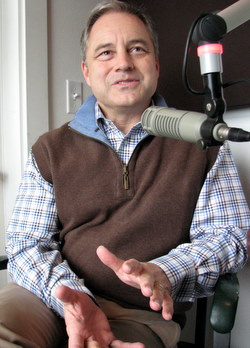The governor scheduled an interview KCAW following his address to the Sitka Chamber of Commerce on Wednesday. On our Facebook page, we gave listeners the chance to submit questions. Most wanted to know how he felt about the Affordable Care Act.
Starting on October 1, uninsured Americans could shop for health plans at state-run marketplaces called “exchanges.”
Except in Alaska, and 25 other states, where the federal government is running the exchanges, because their governors — like ours — chose not to participate.
Alaska’s exchange has two providers, Premera Blue Cross and Moda Health, and the second-highest average premiums in the nation.
Parnell doesn’t think the state could have done a better job on its own.
“I think that’s reflective of the shortcomings of the Affordable Care Act,” he says. “It doesn’t say anything to me about the federal government necessarily setting up the exchange. I think we would have had the same result with the requirements.”
But the governor believes the private market will react to the new exchanges. They’re intended to make shopping for insurance easier. Parnell says Alaskans who don’t like the plans and prices in the federal exchange should keep shopping.
I stood up in a lunch setting last week in Anchorage and right after the rates had just been posted by US Health and Human Services for the states, and it was announced that Alaska had the second-highest rates in the country — premiums — for that health insurance coverage on the exchange. And I asked, Why does our health insurance cost so much on these exchanges? And I had an insurance broker raise her hand — I didn’t know her, she identified herself as an insurance broker — and she said, Governor I can sell a catastrophic policy through my insurance brokerage house for about one-third of what’s being advertised on the exchange. So a light went on in my head, and that week I went to the University of Alaska Fairbanks and met with a group of students there who asked about the exchanges, and I said, If you’re being mandated to go get insurance, go check that exchange, but also check your private broker here to see if you can get a cheaper policy. And I think that’s the message I’m going to have out there. You’re right, there’re only two companies on that exchange, but people may be able to get coverage for less, once they’re mandated to have it.
When the US Supreme Court upheld most of the Affordable Care Act in 2012, KCAW interviewed several commercial fishing families who were excited by the new law, and by the prospects of buying something other than catastrophic health plans. Parnell thinks the relief the ACA may give those smaller businesses is offset by harms to those larger — especially those with 50 or more employees who must now provide health plans.
“You’re speaking to the fleet here, the fishing fleet. But I’m hearing from companies that are trying to reduce hours, trying to keep under the minimums of the Affordable Care Act. Same thing with jobs themselves. It’s going to take a while for this to sort out.”
The Supreme Court ruling gave states an out on an ACA provision that expands Medicaid to residents who live close to the poverty line. Almost everyone who lives at 100-percent or below the line is already covered by Medicaid; the Affordable Care Act would reimburse states to expand that coverage to people living 33-percent above the line.
Read a rebuttal of this position by former Health and Social Services Commissioner Myra Munson.
Parnell says it’s too great a risk. And he’s not going there.
And my question has been, if we expand I know the state is stuck with the financial burden of that insurance for ever and ever, Amen. There’s no getting out of it, politically. So the question is, Will the federal government keep their word? My experience with the federal government is No. I went personally to Secretary Sebelius of US Health and Human Services and asked, Under the Affordable Care Act, could the state of Alaska expand it’s population in that zero-to-100 percent category? In other words, there are people that don’t qualify in the existing Medicaid program, and take advantage of the federal subsidy for that reimbursement? And she said No. She said that she felt it was an all-or-nothing. You can’t expand your existing program to cover those populations that need it, even though they truly are the neediest of the needy, at 100-percent or less of federal poverty level. So she refused that entreaty I made. And on the other hand, I can’t trust the federal government to keep its word. I can trust the Obama administration that they’re going to fund this for the next two or three years. I don’t have a problem with that. It’s what happens after that. This is his signature piece of legislation. He’s going to make sure it gets funded. Presidents come and presidents go, and Medicaid programs get changed.
And we asked Governor Parnell one philosophical question: Alaska has the third-highest gross domestic product per capita in the nation. You wouldn’t know that from the rhetoric in Juneau, which tends to lean toward belt tightening — for schools, for transportation, or other government services. Do we ever get to say, We’re doing all right?
Parnell is cautious about any label, except one.
Let’s call Alaska what it is: a place of opportunity. We’ve got some challenges, clearly. We heard that at the Chamber meeting: meth and drug use among our youth, domestic violence and sexual assault. But, at bottom, we are a state that any person can move here and, with a little determination and persistence, can make it. I’m looking at these small business owners, their vessels out here. My question for each one of us is, How do we overcome the challenges that stand in the way of that opportunity?































